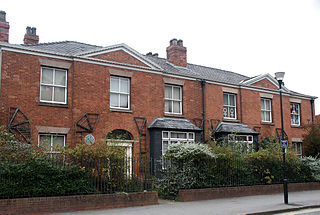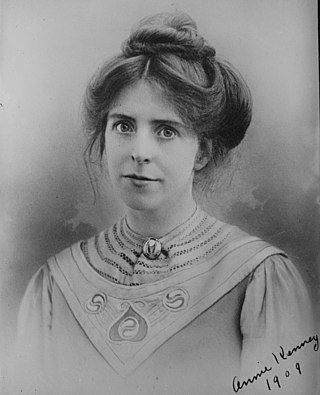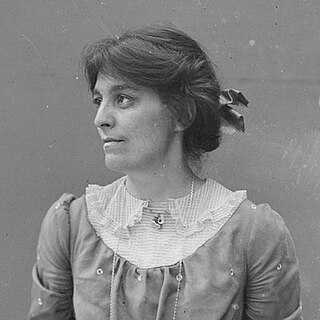
Emmeline Pankhurst was a British political activist who organised the UK suffragette movement and helped women win the right to vote. In 1999, Time named her as one of the 100 Most Important People of the 20th Century, stating that "she shaped an idea of objects for our time" and "shook society into a new pattern from which there could be no going back". She was widely criticised for her militant tactics, and historians disagree about their effectiveness, but her work is recognised as a crucial element in achieving women's suffrage in the United Kingdom.

Estelle Sylvia Pankhurst was an English feminist and socialist activist and writer. Following encounters with women-led labour activism in the United States, she worked to organise working-class women in London's East End. This, together with her refusal in 1914 to enter into a wartime political truce with the government, caused her to break with the suffragette leadership of her mother and sister, Emmeline and Christabel Pankhurst. Pankhurst welcomed the Russian Revolution and consulted in Moscow with Lenin. But as advocate of workers' control, she rejected the Leninist party line and criticised the Bolshevik dictatorship.

Dame Christabel Harriette Pankhurst was a British suffragette born in Manchester, England. A co-founder of the Women's Social and Political Union (WSPU), she directed its militant actions from exile in France from 1912 to 1913. In 1914, she supported the war against Germany. After the war, she moved to the United States, where she worked as an evangelist for the Second Adventist movement.

Richard Marsden Pankhurst was an English barrister and socialist who was a strong supporter of women's rights.

The Women's Social and Political Union (WSPU) was a women-only political movement and leading militant organisation campaigning for women's suffrage in the United Kingdom founded in 1903. Known from 1906 as the suffragettes, its membership and policies were tightly controlled by Emmeline Pankhurst and her daughters Christabel and Sylvia. Sylvia was eventually expelled.

The Pankhurst Centre, 60–62 Nelson Street, Manchester, is a pair of Victorian villas, of which No. 62 was the home of Emmeline Pankhurst and her daughters Sylvia, Christabel and Adela and the birthplace of the suffragette movement in 1903.

Adela Constantia Mary Walsh was a British born suffragette who worked as a political organiser for the WSPU in Scotland. In 1914 she moved to Australia where she continued her activism and was co-founder of both the Communist Party of Australia and the Australia First Movement.

Victoria Tower Gardens is a public park along the north bank of the River Thames in London, adjacent to the Victoria Tower, at the south-western corner of the Palace of Westminster. The park, extends southwards from the Palace to Lambeth Bridge, between Millbank and the river. It forms part of the Thames Embankment.

Ann "Annie" Kenney was an English working-class suffragette and socialist feminist who became a leading figure in the Women's Social and Political Union. She co-founded its first branch in London with Minnie Baldock. Kenney attracted the attention of the press and public in 1905 when she and Christabel Pankhurst were imprisoned for several days for assault and obstruction related to the questioning of Sir Edward Grey at a Liberal rally in Manchester on the issue of votes for women. The incident is credited with inaugurating a new phase in the struggle for women's suffrage in the UK with the adoption of militant tactics. Annie had friendships with Emmeline Pethick-Lawrence, Baroness Pethick-Lawrence, Mary Blathwayt, Clara Codd, Adela Pankhurst, and Christabel Pankhurst.

A suffragette was a member of an activist women's organisation in the early 20th century who, under the banner "Votes for Women", fought for the right to vote in public elections in the United Kingdom. The term refers in particular to members of the British Women's Social and Political Union (WSPU), a women-only movement founded in 1903 by Emmeline Pankhurst, which engaged in direct action and civil disobedience. In 1906, a reporter writing in the Daily Mail coined the term suffragette for the WSPU, derived from suffragist, in order to belittle the women advocating women's suffrage. The militants embraced the new name, even adopting it for use as the title of the newspaper published by the WSPU.

The Emmeline and Christabel Pankhurst Memorial is a memorial in London to Emmeline Pankhurst and her daughter Christabel, two of the foremost British suffragettes. It stands at the entrance to Victoria Tower Gardens, south of Victoria Tower at the southwest corner of the Palace of Westminster. Its main feature is a bronze statue of Emmeline Pankhurst by Arthur George Walker, unveiled in 1930. In 1958 the statue was relocated to its current site and the bronze reliefs commemorating Christabel Pankhurst were added.

Victoria Road is a street in Kensington, London, that in 2015 was considered the most expensive street in the United Kingdom. The street runs north to south from Kensington Road, Kensington High Street in close proximity to Kensington Palace and the Royal Albert Hall. Victoria Road actually runs from Kensington Road and not from Kensington High Street as cited previously. There are 64 properties on the street including the Embassy of Vietnam.

Mary Elizabeth Phillips was an English suffragette, feminist and socialist. She was the longest prison serving suffragette. She worked for Christabel Pankhurst but was sacked; she then worked for Sylvia Pankhurst as Mary Pederson or Mary Paterson. In later life she supported women's and children's organisations.

Mabel Kate Tuke born Mabel Kate Lear was a British suffragette known for her role of honorary secretary of the militant Women's Social and Political Union.

Sophia Jane Goulden was a Manx woman known for being the mother of suffragettes Emmeline Pankhurst and Mary Jane Clarke and she is credited with having an important forming influence on both her daughters’ political beliefs.

The Battle of Downing Street was a march of suffragettes to Downing Street, London, on 22 November 1910. Organized by Emmeline Pankhurst's Women's Social and Political Union, the march took place four days after Black Friday, a suffragette protest outside the House of Commons that saw the women violently attacked by police.
Sylvia is a British musical with book by Kate Prince and Priya Parmer, with music by Josh Cohen and DJ Walde and lyrics by Prince based on the life of Sylvia Pankhurst.

Louie Cullen was a British suffragette and hunger striker who emigrated to Australia to continue her feminist activism. She was imprisoned for her activist work, and was awarded a Holloway brooch.

Eleanor Grace Watney Roe (1885–1979) was Head of Suffragette operations for the Women's Social and Political Union. She was released from prison after the outbreak of World War I due to an amnesty for suffragettes negotiated with the government by the WSPU.
Patricia Woodlock was a British artist and suffragette who was imprisoned seven times, including serving the longest suffragette prison sentence in 1908 ; she was awarded a Women's Social and Political Union (WSPU) Hunger Strike Medal for Valour. Her harsh sentence caused outrage among supporters and inspired others to join the protests. Her release was celebrated in Liverpool and London and drawn as a dreadnought warship, on the cover of the WSPU Votes for Women newsletter.



















